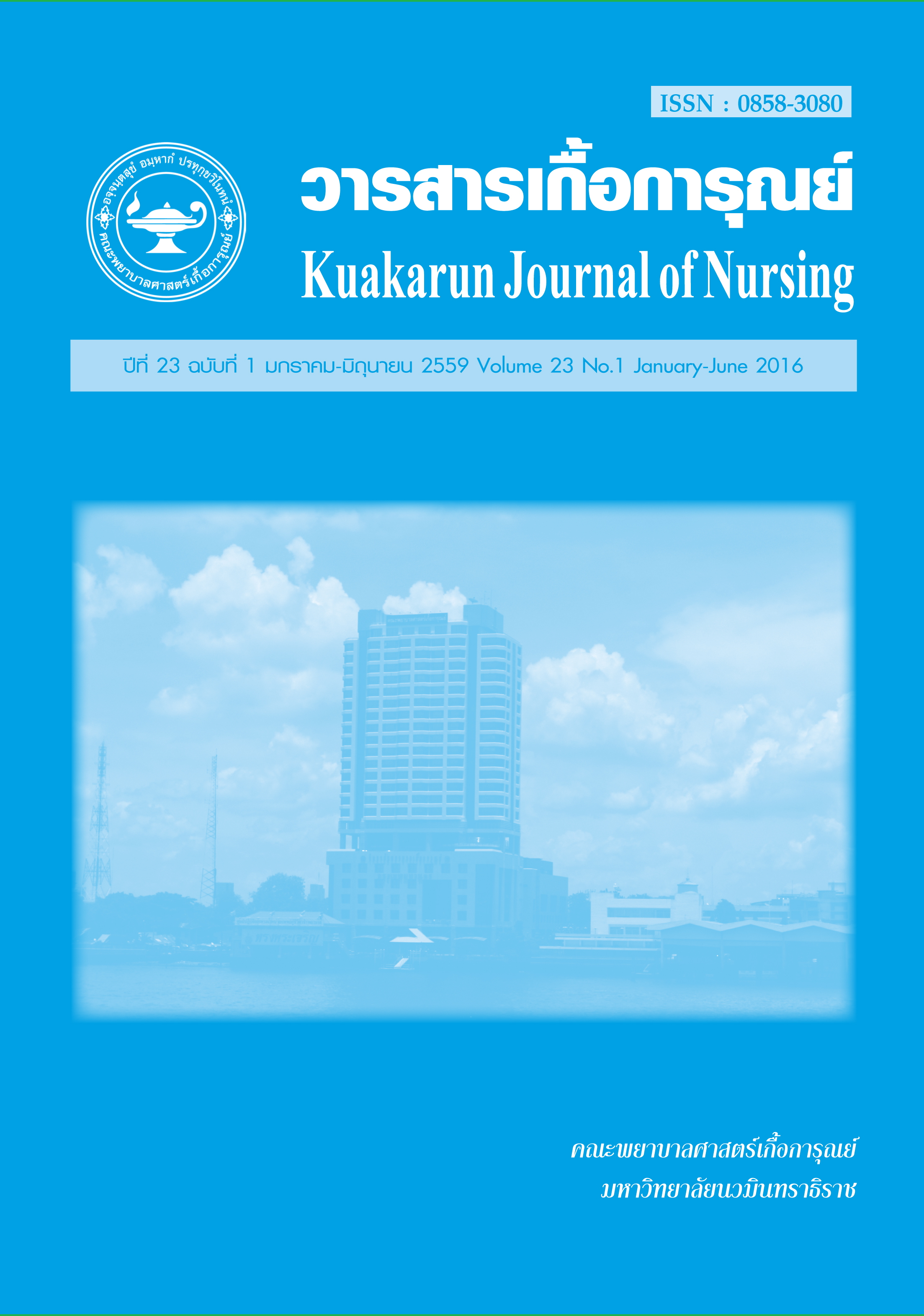ผลของโปรแกรมการมีส่วนร่วมของครอบครัวโดยใช้รามาโมเดล ต่อพฤติกรรมสุขภาพ ภาวะโภชนาการ และระดับน้ำตาลในเลือด ของกลุ่มเสี่ยงโรคเบาหวานในชุมชน Effects of a Family Participation Program by Using The Ramamodelon Health Behaviors, Nutritional Status and Blood Suga
คำสำคัญ:
การมีส่วนร่วมของครอบครัว, กลุ่มเสี่ยงโรคเบาหวาน, พฤติกรรมสุขภาพ, ภาวะโภชนาการ, ระดับน้ำตาลในเลือดบทคัดย่อ
การวิจัยครั้งนี้เป็นการวิจัยกึ่งทดลอง เพื่อศึกษาผลของโปรแกรมการมีส่วนร่วมของครอบครัว โดยใช้รามาโมเดล ต่อพฤติกรรมสุขภาพ ภาวะโภชนาการ และระดับน้ำตาลในเลือด ของกลุ่มเสี่ยงโรคเบาหวานในชุมชน ผู้วิจัยประยุกต์รามาโมเดลและแนวคิดการมีส่วนร่วมของครอบครัวกลุ่มตัวอย่าง คือกลุ่มเสี่ยงโรคเบาหวานที่เข้ารับการตรวจคัดกรองความเสี่ยงที่ศูนย์บริการสาธารณสุขเทศบาลนครสกลนคร ต.ธาตุเชิงชุม อ.เมือง จ.สกลนคร เลือกกลุ่มตัวอย่างแบบเจาะจงตามความสมัครใจ จำนวน 60 คนเป็นกลุ่มทดลอง 30 คน และญาติผู้ดูแล ซึ่งได้รับโปรแกรมการมีส่วนร่วมของครอบครัวโดยใช้รามาโมเดล ระยะเวลา 12 สัปดาห์ ส่วนกลุ่มควบคุม 30 คนได้รับการพยาบาลตามปกติและได้รับเอกสารคู่มือกลับไปศึกษาที่บ้าน ดำเนินการเก็บรวบรวมข้อมูล ระหว่างวันที่ 3 กันยายน - 2 ธันวาคม พ.ศ. 2557 วิเคราะห์ข้อมูลโดยใช้สถิติบรรยาย และสถิติ อ้างอิงได้แก่ Paired t-test, Independent t-test, Repeated measure ANOVA
ผลการวิจัย
1. ภายหลังทดลองสัปดาห์ที่ 4 กลุ่มทดลองมีคะแนนพฤติกรรมสุขภาพ มากกว่าก่อนทดลองอย่างมีนัยสำคัญทางสถิติ (p < .001) และมากกว่ากลุ่มควบคุมอย่างมีนัยสำคัญทางสถิติ (p < .001)
2. ภายหลังทดลองในสัปดาห์ที่ 4 และสัปดาห์ที่ 12 กลุ่มทดลองมีภาวะโภชนาการ (ดัชนีมวลกาย เส้นรอบเอว) และระดับน้ำตาลในเลือด น้อยกว่าก่อนทดลองอย่างมีนัยสำคัญทางสถิติ (p < .001) และน้อยกว่ากลุ่มควบคุมอย่างมีนัยสำคัญทางสถิติ (p < .05, p < .001 ตามลำดับ)
ผลการวิจัยครั้งนี้สามารถใช้เป็นแนวทางในการปรับเปลี่ยนพฤติกรรมสุขภาพโดยการ
มีส่วนร่วมของครอบครัวตามรูปแบบรามาโมเดล เพื่อป้องกันโรคเบาหวานของกลุ่มเสี่ยงในชุมชน
Effects of a Family Participation Program by Using The Ramamodelon Health Behaviors, Nutritional Status and Blood Sugar Level in Diabetic Risk Group in Community
This was quasi-experimental design study aimed at examining the effects of a
family participation program using the RAMA model on health behaviors, nutritional status and blood sugar level in persons with pre-diabetes in communities. The researcher applied the RAMA model and the concept of family participation. The sample included persons with pre-diabetes who received screening at the SakonNakhon Municipality Public Health Service Center, Thadcherngchum Sub-district, Muang District, SakonNakhon Province. The 60 volunteer subjects were recruited by purposive sampling; 30 subjects were assigned to the experimental group and their caregivers participated in the family participation program using RAMA model that lasted 12 weeks including raising awareness through training, aiming at target health, modifying health behavior, follow-up with home visits, and phone calls. The control group included 30 subjects who received routine nursing care with a handbook to take home and study. Data was collected from 3 September to 2 December, 2014. The data was analyzed using descriptive statistics and inferential statistics including Paired t-test, Independent t-test, Repeated measure ANOVA
The results revealed that
1. At 4 weeks after the family participation program using the RAMA model, the experimental group had overall health behavior scores higher than before the experiment with statistical significance (p < .001). The scores were also higher than the control group with statistical significance (p < .001).
2. At 4 weeks and 12 weeks after the program, the experimental group had better nutritional status (lower body mass index and waist circumference) and lower blood sugar levels than before the experiment with statistical significance
(p<.001). The aforementioned scores were also lower than the control group with statistical significance (p < .05, p < .001, respectively).
The results in this study can be used as guidelines for health behavior
modification through family participation following the RAMA model aimed at
preventing diabetes in community dwellers with pre-diabetes.

















